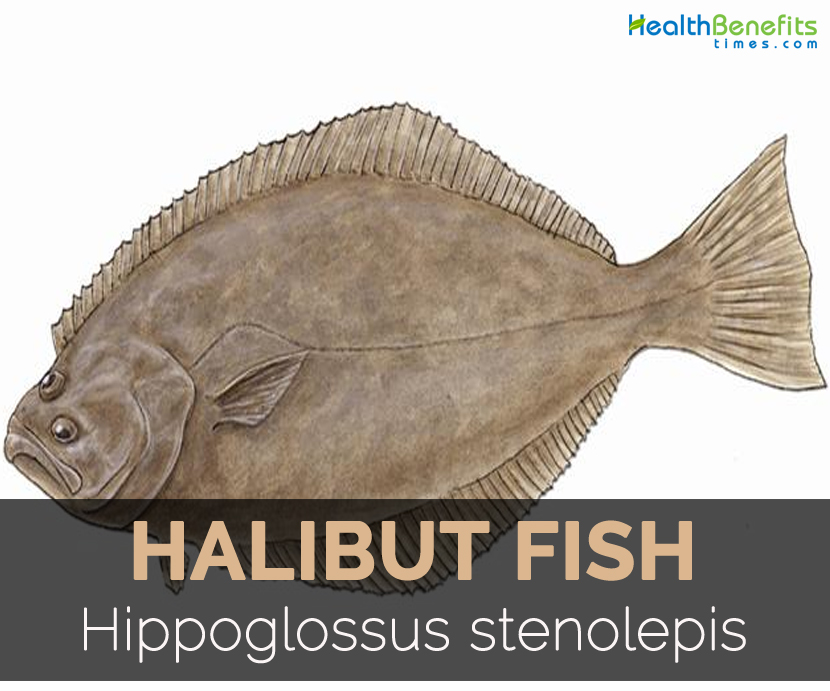| Halibut fish health benefits Quick Facts |
| Name: |
Halibut fish health benefits |
| Scientific Name: |
Hippoglossus stenolepis |
| Origin |
Native to North Pacific and Bering sea |
| Colors |
Dark brown |
| Shapes |
Diamond shaped, elongated |
| Flesh colors |
White |
| Taste |
Pleasant |
| Calories |
176 Kcal./cup |
| Major nutrients |
Selenium (160.18%)
Isoleucine (110.77%)
Lysine (110.35%)
Tryptophan (102.27%)
Threonine (100.11%)
|
| Health benefits |
Maintain cells, Reduce fatigue, Supports digestion, Lowers cholesterol, Enhance immunity |
| More facts about Halibut fish health benefits |
The Pacific halibut (Hippoglossus stenolepis) is the flatfish which belongs to the family Pleuronectidae. They are flattened fish which swim sideways. The upside has gray to brown color with underside white. The halibut are right eyed which is located on the upper and dark side of body. The body is elongated or diamond shaped. The small scales are buried in skin which makes the skin look smooth. It has symmetrical and broad tail. The maximum size of Pacific halibut that has been reported weighs 500 pounds and 8 feet long. Its diet is cod, pollock, turbot, octopus, shrimp, crab, eel, lamprey, sculpin. The spawning took place in December through February. Hippoglossus stenolepis is also known as Pacific halibut, Halibut, Alaska Halibut, Hippos of the Sea, Cow of the Sea, Chicken Halibut and Hirame. The term is derived from word haly and butte which means holy and flat fish respectively.
Nutritional value
Cooked halibut of 159 grams provides 121.03 grams of moisture, 176 calories, 35.84 grams of protein, 2.56 grams of total lipid fat and 2.5 grams of ash. The same serving size grants 160.18% of selenium, 110.77% of isoleucine, 110.35% of lysine, 102.27% of tryptophan, 100.11% of threonine, 98.01% of valine, 96.19% of histidine, 88.39% of leucine, 84.17% of cobalamine, 78.61% of niacin, 77.31% of pyridoxine, 71.68% of protein, 65.14% of phosphorus, 21.71% of choline, 17.87% of potassium, 13.22% of Vitamin B5 and 10.71% of magnesium.
Health Benefits of Halibut fish
Halibut fish has high content of Omega 3 fatty acids which has protective effect on cardiovascular system to prevent heat ailments, maintain balance between HDL and LDL cholesterol, prevent atherosclerosis, high blood pressure, arteries clotting, lower triglycerides, inflammation and stroke. The presence of magnesium relaxes veins and arteries by promoting the flow of blood and transport oxygen throughout the body. Mostly often, it is baked, broiled and grilled.
- Maintain cells
Vitamin B12 helps to maintain the cells in human body. It plays a vital role for the functions such as repair, formation and maintains red blood cells. It also helps to maintain the nervous health.
- Reduce fatigue
It provides relief from fatigue as well as weakness. Vitamin B12 enhance stamina in body.
- Supports digestion
Vitamin B3 supports the functions of digestive system, stimulates appetite, glowing skin and nerve function.
- Lowers cholesterol
The high intake of Vitamin B3 lowers LDL cholesterol and increase the level of HDL cholesterol. It also prevents thickening of artery walls as well as conditions such as atherosclerosis.
- Enhance immunity
Pyridoxine has a vital role in the functions of immune system. It prevents infections and in the absence of this vitamin the body could be victimized. (1)
- Regenerates tissues and cells
The restoration and renewal of tissues and cells helps to maintain the health. The amino acids is essential for protein formation which helps to form cells as well as tissues such as hair, nails and skin. The cells in skin and blood last for a couple of weeks only. So the body needs to replace the lost ones. Protein assists in the formation of new cells. (2) (3)
- Muscle problems
Phosphorus prevents the health ailments such as numbness, muscle weakness and fatigue. It also helps to become fit as well as active. It also cures sexual weakness and health problems such as frigidity, loss of libido, sperm motility and impotence with the adequate amount of phosphorus. (4)
- Brain health
Potassium has a vital role to maintain the functions of brain. It enhances brain functions such as learning and memory. Moreover, the deficiency of potassium leads to serious ailments such as epilepsy. Potassium currents are vital for mammalian neurons which is associated with neural functions. (5)
- Lowers stress
Pantothenic acid lowers stress and mental conditions such as depression, anxiety and mind fitness. it regulates hormone which are the cause for these conditions. (6)
- Prevent heart ailments
Magnesium prevents the irregular heartbeats and prevents heart from muscle stress or damage. It soothes nerves and resolve digestive process. It also prevents the conditions such as cramps, vomiting, abdominal pain, indigestion, constipation and flatulence. (7)
Precautions
- It should be avoided by the pregnant women due to high mercury content.
- It has purines which might cause health ailments such as formation of kidney stones and gout.
- The patients of uric acid, gout and kidney problems should consume it with caution.
- The people who are allergic to Halibut fish should avoid it.
http://lifestyle.iloveindia.com/lounge/benefits-of-halibut-6296.html
How to Eat
- It is deep fried, boiled or grilled.
- The steamed Halibut is consumed with black bean sauce.
https://en.wikipedia.org/wiki/Halibut
Other Facts
- In Alaska, Halibut fishing as a sport is very popular.
- The biggest Pacific halibut measures above eight feet long and weighs 500 pounds.
- They are strong swimmers and have large mouth.
- It hunts on ocean floor.
- Pacific halibut have lived for about 55 years.
References:
https://www.organicfacts.net/health-benefits/vitamins/health-benefits-of-vitamin-b12-or-cyanocobalamin.html
https://www.organicfacts.net/health-benefits/vitamins/vitamin-b3-or-niacin.html
Comments
comments


